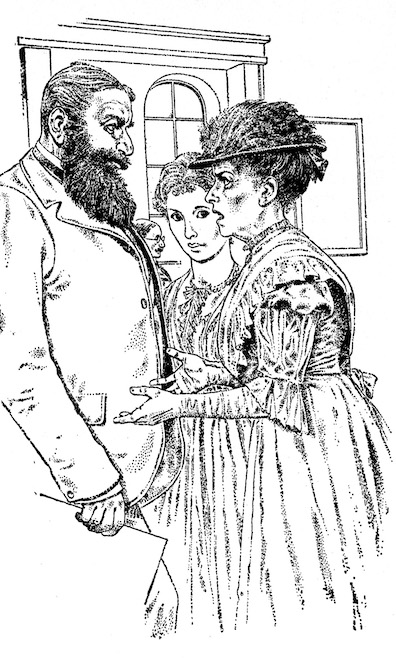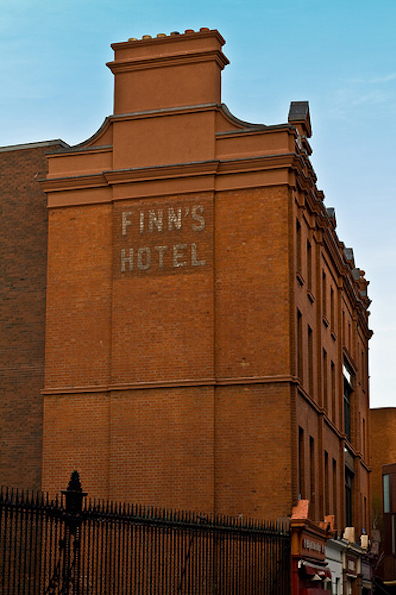In a book stuffed to the rafters with minor characters,
"Hoppy Holohan" is one of the most minor. Joyce probably based
him on an actual person that he learned about from Nora, but
biographical information about this person has not been found.
Holohan plays a fairly important, though ignominious, role in
the Dubliners story "A Mother," but in Ulysses
he is reduced to having two people ask two other people
whether they know him.
"A Mother" begins with a paragraph introducing him: "Mr
Holohan, assistant secretary of the Eire Abu Society,
had been walking up and down Dublin for nearly a month, with
his hands and pockets full of dirty pieces of paper, arranging
about the series of concerts. He had a game leg and for this
his friends called him Hoppy Holohan. He walked up and down
constantly, stood by the hour at street corners arguing the
point and made notes; but in the end it was Mrs Kearney who
arranged everything." Mrs. Kearney makes the arrangements,
energetically and at some considerable expense, because her
daughter Kathleen is scheduled to perform in the four concerts
for a sum of eight guineas. But the opening night proves to be
a sorry affair, with a small house and mediocre artistes,
making Mrs. Kearney fearful that her daughter will not be
paid.
She harasses Holohan for payment, saying that Kathleen will
not go on without it, and, with audience members stamping,
clapping, and whistling, is finally given half the agreed-upon
sum in advance, minus four shillings. Her unladylike
insistence is roundly criticized, even though the narrative
notes that one of the male performers "had been paid his
money" in advance. At intermission she continues to fume: "She
had spared neither trouble nor expense and this was how she
was repaid. / They thought they had only a girl to deal with
and that, therefore, they could ride roughshod over her. But
she would show them their mistake. They wouldn't have dared to
have treated her like that if she had been a man. But she
would see that her daughter got her rights: she wouldn't be
fooled. If they didn't pay her to the last farthing she would
make Dublin ring."
Mr. Holohan tells her that Kathleen will receive the second
half of her payment in the following week, if she performs in
the second half of the concert. Mrs. Kearney insists on being
paid immediately, and Kathleen is forced to withdraw from the
concert's second half. Trying to salvage some dignity from
this disaster, the mother tells Holohan "I'm not done with you
yet." He replies, "But I'm done with you." After she leaves he
too is fuming: "That's a nice lady!... O, she's a nice lady!"
The story ends with Mr. O'Madden Burke assuring him, "You did
the proper thing."
Holohan's shoddy management and complacent chauvinism carry
over into Ulysses only by the slenderest of threads.
In Aeolus Mr. O'Madden Burke, the man who closed ranks
with him at the end of "A Mother," discusses details of the
Phoenix Park murders with Myles Crawford and says, "Holohan
told me. You know Holohan?" This passing reference
echoes a similar exchange in Lotus Eaters. When M'Coy learns that Bloom is going
to Paddy Dignam's funeral,
he says, "I only heard it last night. Who was telling me?
Holohan. You know Hoppy?" Bloom replies, "I know."
Crawford replies, "Hop and carry one, is it?" In Circe
Holohan fills a small and purely choral role. He has one line:
"Good old Bloom! There’s nobody like him after all."
In August 1909 Joyce was reeling from Vincent Cosgrave's malicious
claim that he slept with Nora when she was first seeing
Joyce in 1904. He wrote her from Dublin to ask, "Is Georgie my
son?... Were you fucked by anyone before you came to me? You
told me that a gentleman named Holohan (a good Catholic, of
course, who makes his Easter duty regularly) wanted to fuck
you when you were in that hotel, using what they call a
'French letter'. Did he do so? Or did you allow him only to
fondle you and feel you with his hands?" (Selected Joyce
Letters, 158). Vivien Igoe writes that "Holohan appeared
as a guest in Finn's Hotel in Leinster Street where the
19-year-old Nora was working as a chambermaid in the early
months of 1904. He tried unsuccessfully to seduce her. Holohan
could well have served as the model for the Holohan in Joyce's
fiction." Joyce frequently used fiction to settle old scores.

